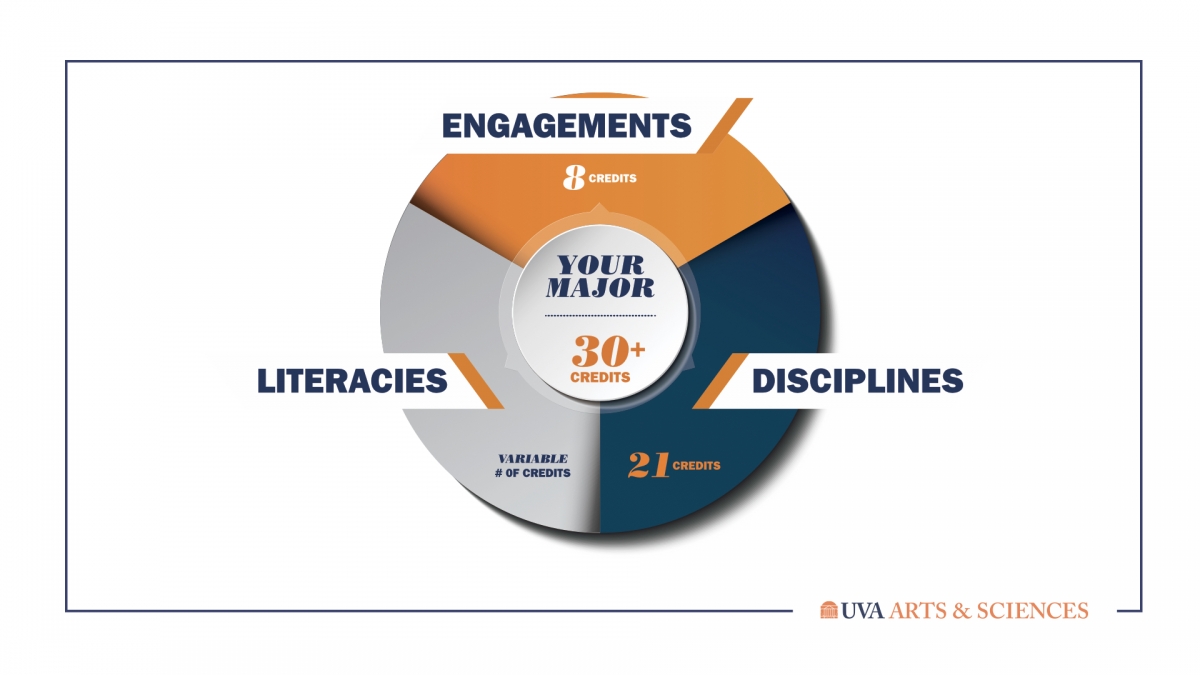General Education Requirements
Leveraging interdisciplinary approaches to enduring and emergent questions, courses in the College of Arts & Sciences rigorous liberal arts Curriculum foster our capacity to engage new ideas, make new discoveries, and challenge our preconceived notions. You will be active contributors not only in your own education, but in the intellectual work of the University – the first step towards engaged citizenship.
Engagements
Faculty from across the Arts & Sciences are invited to design their dream courses in collaboration with other faculty – and then teach these courses in a small seminar-style format to first-year students as a way of introducing you to fundamental intellectual questions that will guide the rest of your studies at UVA.
Engagements >>
Literacies
The Literacies help you master vital skills and expand your capacity to understand and engage the world even more deeply. You will equip yourselves with modern languages, learning how to communicate in speech and writing, with numbers, and across barriers.
Literacies >>
Disciplines
The Disciplines allow you to explore the different scholarly practices and disciplinary thinking manifest throughout the Arts & Sciences. Discoveries in the disciplines will not only foster vocational calling but will equip you with the intellectual expertise to engage critical issues and complex challenges in an ever-changing cosmopolitan world.
Disciplines >>
Engagements Pathway
Students in the Engagements Pathway fulfill their general education requirements by taking courses across three components:

Engagements (8 credits)
The Engagements are a series of courses offered exclusively for first-year students in the Engagements Pathway. All first-year students in the Engagements Pathway must complete one 2-credit course in each of the four Engagements (totaling 8 credits):
- EGMT 1510 - Engaging Aesthetics
- EGMT 1520 - Empirical and Scientific Engagement
- EGMT 1530 - Engaging Differences
- EGMT 1540 -Ethical Engagement
Engagement courses meet for 7 weeks. Students are advised to enroll in only one of these courses at a given time – thus, a typical student would enroll in two consecutive 7-week Engagements in each semester.
Students in the Engagements Pathway must enroll in four EGMT classes in their first year. Students may not enroll in more than 2 Engagement courses (4 credits) in a given semester. In practice, this means students will enroll in two Engagement courses in the Fall and two Engagement courses in the Spring. Students who fail to enroll in the required Engagement courses will be enrolled by the College.
Literacies (variable credits)
Students in the College Curriculum must also complete the Literacies – three sets of courses with variable credit. While the Engagements cultivate mindsets that are fundamental to learning in the Liberal Arts, the Literacies equip students with the necessary skills needed to succeed in a rapidly-transforming world. The three Literacies include:
Disciplines (21 credits)
The Disciplines ask students in the New College Curriculum to explore the varied ways our faculty approach knowledge, learning, and discovery. Students in the College Curriculum must earn 3 credits in each of the seven Discipline categories. Courses that count towards the Disciplines must be taken from six different departments.
- Artistic, Interpretive, and Philosophical Inquiry
- The Chemical, Mathematical, and Physical Universe
- Cultures and Societies of the World
- Historical Perspectives
- Living Systems
- Social and Economic Systems
- Science and Society
Courses taken to fulfill major requirements may count towards the Disciplines. While courses may be cross-listed in multiple Discipline categories, courses may only count towards fulfilling one category for each student (example: While HIEU 3321 Scientific Revolution is cross-listed in both “Science & Society” and “Historical Perspectives,” a student must individually choose which category she/he desires it to fulfill.
*Bachelor of Science Discipline Requirements
The following modifications to the Disciplines requirements are granted to those students enrolled in a Bachelor of Science program:
- Students enrolled in a Bachelor of Science degree may elect to take 9 credits in one or two of the three following categories (rather than 3 credits in each): The Chemical and Physical Universe, Living Systems, and Science & Society.
- Students enrolled in a Bachelor of Science degree may double-count one course (3 credits) towards fulfilling two of the following three categories: Cultures and Societies of the World, Historical Perspectives, Social and Economic Systems. The course in question must be listed in both categories for which it will count. Though the course may be listed in more than two categories, it may only count as fulfilling two categories.
- Bachelor of Science students must fulfill the Disciplines component by taking courses in five different departments.
Regulations
- External credit earned before your first semester at UVA may fulfill some College Curriculum requirements. X000T credit does not satisfy general education requirements.
- All courses that count towards the College Curriculum must be taken for credit and for a grade.
- Courses that fulfill a Disciplines category may also satisfy the Second Rhetoric for the 21st Century Requirement where applicable.
To help students keep track of their progress towards completing the College Curriculum, the College offers requirement checklists for both the Disciplines Plus Pathway and the Engagements Pathway.




